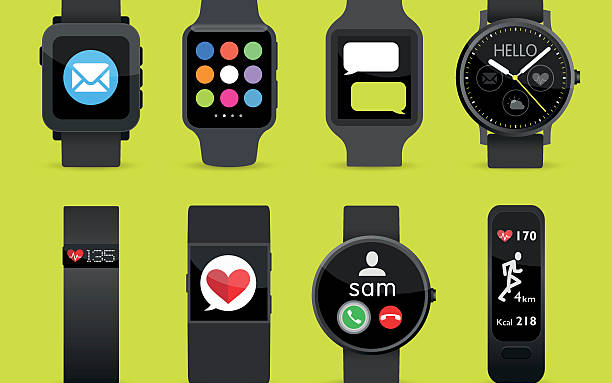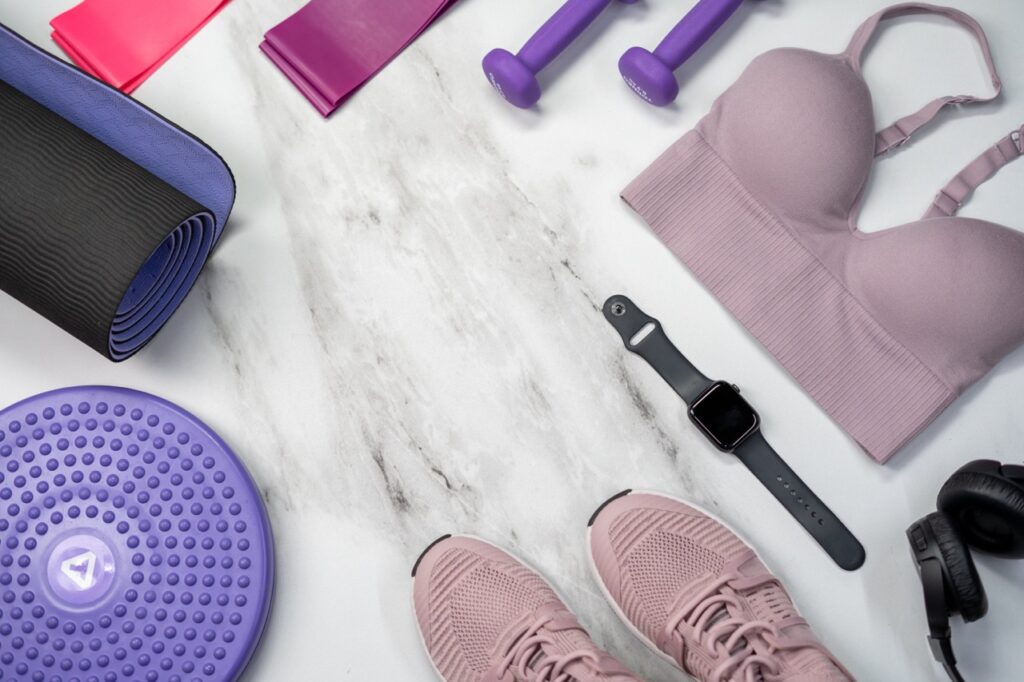Fitness Gadgets
All About Fitness Trackers and Smartwatches
Do you want to improve your fitness routine? Take a look at fitness trackers and smartwatches. These wearable technologies have transformed the way we approach our health and fitness objectives. We’ll delve deep into the world of fitness trackers and smartwatches in our complete guide, analyzing their features, benefits, and all you need to know to make an informed decision.

Benefits of using fitness trackers and smartwatches
1. Activity Tracking: Fitness trackers and smartwatches keep track of your daily activities, such as steps walked, distance traveled, and calories burned. This data assists you in setting objectives and tracking your progress, giving you a sense of accomplishment and inspiration.
2. Heart Rate Monitoring: Many fitness trackers and smartwatches include heart rate sensors that measure your heart rate continually throughout the day. This function enables you to optimize your exercises, stay in the proper heart rate zone, and avoid overexertion.
3. Sleep Tracking: Understanding your sleep habits is essential for overall health and well-being. Sleep tracking capabilities on fitness trackers and smartwatches assess your sleep quality, duration, and stages. With this knowledge, you can make changes to improve your sleeping habits.
4. Goal Setting and Progress Tracking: Setting objectives is an important component of any fitness journey. Fitness trackers and smartwatches enable you to define and track personalized objectives. These devices hold you accountable and motivated, whether it’s a step count target, a distance goal, or a calorie burn goal.
5. Notifications and Connectivity: Smartwatches, in particular, allow you to receive notifications, calls, and messages straight on your wrist. You can stay connected without continually checking your phone, allowing you to focus on your workout or other activities.
6. GPS Tracking: If you’re an outdoor enthusiast or enjoy running or cycling, smartwatches with built-in GPS can be game changers. GPS monitoring helps you to measure your routes, distance, and pace accurately, providing vital insights into your outdoor exercises.
Types of fitness trackers and smartwatches available in the market
1. Basic Fitness Trackers: Basic fitness trackers primarily track activity. They usually have a simple design with a small display that displays basic information such as steps taken, calories burnt, and distance traveled. These devices are appropriate for anyone who desire a simple and inexpensive way to track their everyday activity.
2. Advanced Fitness Trackers: In addition to basic activity tracking, advanced fitness trackers provide extra functionality. Heart rate monitoring, sleep tracking, and more advanced sensors may be included. These gadgets offer more extensive insights into your health and fitness, making them suitable for those looking for a more comprehensive tracking experience.
3. Smartwatches: Fitness monitoring capabilities are combined with enhanced smart features in smartwatches. They provide capabilities such as notifications, music control, contactless payments, and even app support in addition to activity tracking. Smartwatches are ideal for people who desire a multifunctional technology that integrates effortlessly into their daily lives.
4. Sports-specific Trackers: Some fitness trackers and smartwatches are specifically built for specific sports or activities. Trackers for runners, swimmers, and cyclists, for example, offer unique features and stats relevant to those activity. If you are passionate about a particular sport or activity, a sports-specific tracker might provide significant insights and analysis.
5. Fashion-oriented Trackers: Fashion-oriented fitness trackers and smartwatches offer a blend of aesthetics and features for individuals who value style as much as usefulness. These devices prioritize design and fashion trends, allowing you to look good while meeting your health and exercise goals.

Features to consider when choosing a fitness tracker or smartwatch
1. Display: Consider the display’s size, kind, and resolution. A larger display may provide improved reading, but it may also add bulk to the gadget. Choose the sort of display that best meets your needs, whether it’s a vibrant LCD or a more power-efficient OLED.
2. Battery Life: Battery life is critical, especially if you intend to use your gadget throughout the day without charging it frequently. Look for devices that have a longer battery life or that can charge quickly.
3. Water Resistance: If you want to swim or other water sports, make sure the device is water-resistant. Some devices are just splash-resistant, but others are completely waterproof and may be submerged in water. Examine the water resistance rating to ensure it matches your needs.
4. Compatibility: Determine whether the fitness tracker or smartwatch is compatible with the operating system of your smartphone. Some gadgets may be confined to specific platforms, such as iOS or Android, so check compatibility before purchasing.
5. Sensors: Take into account the sensors that come with the gadget. In fitness trackers and smartwatches, common sensors include heart rate sensors, GPS, gyros, accelerometers, and sleep trackers. Choose a device with sensors that are relevant to your fitness goals.
6. App Ecosystem: The supporting app is critical to unlocking the full capabilities of your device. Examine whether the app is easy to use, provides thorough data analysis, and interfaces with other fitness and health platforms you use.
7. Design and Comfort: Because you’ll be wearing the gadget for extended periods of time, it’s critical to select a design that complements your style and is comfortable on your wrist. Consider the strap material, clasp type, and overall appearance.

How fitness trackers and smartwatches track your health and fitness
1. Accelerometers: Accelerometers are motion sensors that measure the movement of your body. Changes in speed, direction, and intensity are detected, allowing the device to track steps, distance, and calories burned. Almost all fitness trackers and smartwatches contain accelerometers.
2. Heart Rate Monitoring: Heart rate sensors employ optical technology to analyze blood flow under your skin to determine your heart rate. This function allows you to measure your resting heart rate, monitor your heart rate throughout workouts, and assess your overall cardiovascular health.
3. GPS Tracking: Smartwatches and some fitness trackers use GPS (Global Positioning System) to properly track your outside activities. GPS technology delivers accurate information about your location, distance traveled, and speed, making it suitable for sports such as running, cycling, and hiking.
4. Sleep Tracking: Sleep monitoring employs a combination of motion sensors and heart rate monitoring. Fitness trackers and smartwatches may assess your sleep stages (light, deep, REM) and provide insights into your sleep quality by sensing your movement patterns and heart rate fluctuations during sleep.
5. Pulse Oximetry: Some advanced fitness trackers and smartwatches include pulse oximeters, which measure the amount of oxygen in your blood. This metric can provide information about your overall health and fitness, as well as assist in the identification of potential sleep disorders such as sleep apnea.
Popular fitness tracker and smartwatch brands
1. Fitbit: In the fitness tracking sector, Fitbit is a well-known brand. They provide a variety of fitness trackers and smartwatches to meet a variety of needs and budgets. Fitbit devices are well-known for their precise tracking, easy-to-use apps, and extensive fitness and wellness capabilities.
2. Apple: Apple Watches, the company’s smartwatches, are well-known for their seamless connection with the iOS ecosystem. These gadgets have advanced capabilities such as ECG monitoring, fall warning, and access to a variety of health and fitness apps. Apple Watches are well-known for their elegant appearance and simple user interface.
3. Garmin: Garmin is a GPS technology company that is famous among outdoor lovers and athletes. Their fitness trackers and smartwatches include powerful GPS tracking, comprehensive training options, and long battery life. Garmin products are well-known for their toughness and dependability in harsh conditions.
4. Samsung: Samsung’s smartwatches strike an excellent blend of beauty and usefulness. Samsung smartphones appeal to a wide spectrum of customers with features such as heart rate tracking, built-in GPS, and a number of health and fitness apps. Their smartwatches also work in tandem with Samsung smartphones.
5. Xiaomi: Xiaomi is well-known for their low-cost but feature-rich fitness trackers. Their products include precise tracking, long battery life, and a variety of health and fitness features. Xiaomi fitness trackers are popular among those on a tight budget who want a dependable device without breaking the bank.

Comparison between fitness trackers and smartwatches
1. Fitness Tracking: Activity monitoring capabilities such as step counting, distance tracking, and calorie burn estimation are available on both fitness trackers and smartwatches. However, due to sophisticated sensors and algorithms, fitness trackers frequently provide more precise and thorough fitness measures.
2. Advanced Health Monitoring: Advanced health monitoring features such as ECG (Electrocardiogram) and SpO2 (Blood Oxygen Saturation) measures are exceptional in smartwatches. These qualities can aid in the detection of abnormal cardiac rhythms and provide information about your general health. Although fitness trackers provide basic heart rate monitoring, they lack these sophisticated health capabilities.
3. Smart Features: In addition to fitness tracking, smartwatches have functions such as notifications, music control, contactless payments, and app support. A smartwatch is the way to go if you want a device that interfaces with your smartphone and provides additional smart functionality.
4. Battery Life: Fitness trackers have a longer battery life than smartwatches. Depending on the type and usage, fitness trackers can last anywhere from a few days to several weeks. Because of their more power-hungry features, smartwatches often require daily charge.
5. Design and Aesthetics: Smartwatches frequently focus design and aesthetics, with a variety of styles, materials, and customisable watch faces available. Fitness trackers typically have a simpler and more minimalistic design that focuses on functionality rather than fashion.
6. Cost: Fitness trackers are often less expensive than smartwatches. If you’re on a tight budget or are only interested in fitness tracking, a fitness tracker may be a better option. Smartwatches, particularly those from high-end brands, might be prohibitively pricey.
To establish if a fitness tracker or a smartwatch is the appropriate choice for you, you must first examine your needs and priorities. If tracking your fitness is your primary purpose, a dedicated fitness tracker may suffice. A smartwatch, on the other hand, may be a better alternative if you want a multifunctional device with advanced health monitoring and smart functions.
Conclusion
Fitness trackers and smartwatches offer a myriad of benefits for individuals striving to lead healthier, more active lives. Whether you’re focused on tracking your physical activity or seeking a versatile wearable with additional smartwatch capabilities, there’s a device tailored to your preferences. By integrating these devices into your lifestyle, you can gain valuable insights, stay motivated, and ultimately achieve your fitness and wellness goals.


